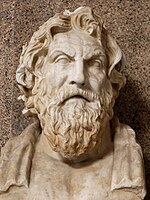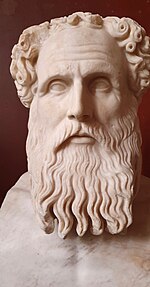
A | B | C | D | E | F | G | H | CH | I | J | K | L | M | N | O | P | Q | R | S | T | U | V | W | X | Y | Z | 0 | 1 | 2 | 3 | 4 | 5 | 6 | 7 | 8 | 9

The meaning of life pertains to the inherent significance or philosophical meaning of living (or existence in general). There is not a definitive answer, and thinking or discourse on the topic is sought in the English language through the question, "What is the meaning of life?" (or the related "Why are we here?" or "What is the purpose of existence?"). There have been many proposed answers to these questions from many different cultural and ideological backgrounds. The search for life's meaning has produced much philosophical, scientific, theological, and metaphysical speculation throughout history. Different people and cultures believe different things for the answer to this question. Opinions vary on the usefulness of using time and resources in the pursuit of an answer. Excessive pondering can be indicative of, or lead to, an existential crisis.
The meaning of life can be derived from philosophical and religious contemplation of, and scientific inquiries about, existence, social ties, consciousness, and happiness. Many other issues are also involved, such as symbolic meaning, ontology, value, purpose, ethics, good and evil, free will, the existence of one or multiple gods, conceptions of God, the soul, and the afterlife. Scientific contributions focus primarily on describing related empirical facts about the universe, exploring the context and parameters concerning the "how" of life. Science also studies and can provide recommendations for the pursuit of well-being and a related conception of morality. An alternative, humanistic approach poses the question, "What is the meaning of my life?"
Origin of the expression

The first English use of the expression "meaning of life" appears in Thomas Carlyle's Sartor Resartus (1833–1834), book II chapter IX, "The Everlasting Yea".[1]
Our Life is compassed round with Necessity; yet is the meaning of Life itself no other than Freedom, than Voluntary Force: thus have we a warfare; in the beginning, especially, a hard-fought battle.[2]
Carlyle may have been inspired by earlier usage of the equivalent German expression der Sinn des Lebens by German Romantic writers Novalis and Friedrich Schlegel. Schlegel was the first to use it in print by way of his novel Lucinde (1799), though Novalis had done so in a 1797–1798 manuscript, in which he wrote: "Only an artist can divine the meaning of life." Additionally, the word lebenssinn, translated as life's meaning, had been used by Goethe in a 1796 letter to Schiller.[3] These authors grappled with the rationalism and materialism of modernity. Carlyle called this the "Torch of Science", which burned "more fiercely than ever" and made religion "all parched away, under the Droughts of practical and spiritual Unbelief", resulting in the "Wilderness" of "the wide World in an Atheistic Century".[4]
Origin of the question

Arthur Schopenhauer was the first to explicitly ask the question,[1] in an essay entitled "Character".
Since a man does not alter, and his moral character remains absolutely the same all through his life; since he must play out the part which he has received, without the least deviation from the character; since neither experience, nor philosophy, nor religion can effect any improvement in him, the question arises, What is the meaning of life at all? To what purpose is it played, this farce in which everything that is essential is irrevocably fixed and determined?[5]
Questions about the meaning of life, and similar, have been expressed in a broad variety of other ways, including:
- What is the meaning of life? What's it all about? Who are we?[6][7][8]
- Why are we here? What are we here for?[9][10][11]
- What is the origin of life?[12]
- What is the nature of life? What is the nature of reality?[12][13][14]
- What is the purpose of life? What is the purpose of one's life?[13][15][16]
- What is the significance of life?[16] (See also #Psychological significance and value in life)
- What is meaningful and valuable in life?[17]
- What is the value of life?[18]
- What is the reason to live? What are we living for?[11][19]
These questions have resulted in a wide range of competing answers and explications, from scientific theories, to philosophical, theological, and spiritual explanations.
Scientific inquiry and perspectives
Many members of the scientific community and philosophy of science communities think that science can provide the relevant context, and set of parameters necessary for dealing with topics related to the meaning of life. In their view, science can offer a wide range of insights on topics ranging from the science of happiness to death anxiety. Scientific inquiry facilitates this through nomological investigation into various aspects of life and reality, such as the Big Bang, the origin of life, and evolution, and by studying the objective factors which correlate with the subjective experience of meaning and happiness.
Psychological significance and value in life
Researchers in positive psychology study empirical factors that lead to life satisfaction,[20] full engagement in activities,[21] making a fuller contribution by using one's personal strengths,[22] and meaning based on investing in something larger than the self.[23] Large-data studies of flow experiences have consistently suggested that humans experience meaning and fulfillment when mastering challenging tasks and that the experience comes from the way tasks are approached and performed rather than the particular choice of task. For example, flow experiences can be obtained by prisoners in concentration camps with minimal facilities, and occur only slightly more often in billionaires. A classic example[21] is of two workers on an apparently boring production line in a factory. One treats the work as a tedious chore while the other turns it into a game to see how fast he/she can make each unit and achieves flow in the process.
Neuroscience describes reward, pleasure, and motivation in terms of neurotransmitter activity, especially in the limbic system and the ventral tegmental area in particular. If one believes that the meaning of life is to maximize pleasure and to ease general life, then this allows normative predictions about how to act to achieve this. Likewise, some ethical naturalists advocate a science of morality—the empirical pursuit of flourishing for all conscious creatures.
Experimental philosophy and neuroethics research collects data about human ethical decisions in controlled scenarios such as trolley problems. It has shown that many types of ethical judgment are universal across cultures, suggesting that they may be innate, whilst others are culture-specific. The findings show actual human ethical reasoning to be at odds with most philosophical theories, for example consistently showing distinctions between action by cause and action by omission which would be absent from utility-based theories. Cognitive science has theorized about differences between conservative and liberal ethics and how they may be based on different metaphors from family life such as strong fathers vs nurturing mother models.
Neurotheology is a controversial field which tries to find neural correlates and mechanisms of religious experience. Some researchers have suggested that the human brain has innate mechanisms for such experiences and that living without using them for their evolved purposes may be a cause of imbalance. Studies have reported conflicting results on correlating happiness with religious belief and it is difficult to find unbiased meta-analyses.[24][25]
Sociology examines value at a social level using theoretical constructs such as value theory, norms, anomie, etc. One value system suggested by social psychologists, broadly called Terror Management Theory, states that human meaning is derived from a fundamental fear of death, and values are selected when they allow us to escape the mental reminder of death.
Alongside this, there are a number of theories about the way in which humans evaluate the positive and negative aspects of their existence and thus the value and meaning they place on their lives. For example, depressive realism posits an exaggerated positivity in all except those experiencing depressive disorders who see life as it truly is, and David Benatar theorises that more weight is generally given to positive experiences, providing bias towards an over-optimistic view of life.
Emerging research shows that meaning in life predicts better physical health outcomes. Greater meaning has been associated with a reduced risk of Alzheimer's disease,[26][27] reduced risk of heart attack among individuals with coronary heart disease,[28] reduced risk of stroke,[29] and increased longevity in both American and Japanese samples.[30] There is also growing evidence for a small decline in purpose in life in the early stages of cognitive impairment.[31]
In 2014, the British National Health Service began recommending a five-step plan for mental well-being based on meaningful lives, whose steps are:[32]
- Connect with community and family
- Physical exercise
- Lifelong learning
- Giving to others
- Mindfulness of the world around you
Origin and nature of biological life

The exact mechanisms of abiogenesis are unknown: notable hypotheses include the RNA world hypothesis (RNA-based replicators) and the iron-sulfur world hypothesis (metabolism without genetics). The process by which different lifeforms have developed throughout history via genetic mutation and natural selection is explained by evolution.[33] At the end of the 20th century, based upon insight gleaned from the gene-centered view of evolution, biologists George C. Williams, Richard Dawkins, and David Haig, among others, concluded that if there is a primary function to life, it is the replication of DNA and the survival of one's genes.[34][35] Responding to an interview question from Richard Dawkins about "what it is all for", James Watson stated "I don't think we're for anything. We're just the products of evolution."[36]
Though scientists have intensively studied life on Earth, defining life in unequivocal terms is still a challenge.[37][38] Physically, one may say that life "feeds on negative entropy"[39][40][41] which refers to the process by which living entities decrease their internal entropy at the expense of some form of energy taken in from the environment.[42][43][44] Biologists generally agree that lifeforms are self-organizing systems which regulate their internal environments as to maintain this organized state, metabolism serves to provide energy, and reproduction causes life to continue over a span of multiple generations. Typically, organisms are responsive to stimuli and genetic information changes from generation to generation, resulting in adaptation through evolution; this optimizes the chances of survival for the individual organism and its descendants respectively.[45]
Non-cellular replicating agents, notably viruses, are generally not considered to be organisms because they are incapable of independent reproduction or metabolism. This classification is problematic, though, since some parasites and endosymbionts are also incapable of independent life. Astrobiology studies the possibility of different forms of life on other worlds, including replicating structures made from materials other than DNA.
Origins and ultimate fate of the universe

Though the Big Bang theory was met with much skepticism when first introduced, it has become well-supported by several independent observations.[46] However, current physics can only describe the early universe from around 10−43 seconds after the Big Bang (where zero time corresponds to infinite temperature); a theory of quantum gravity would be required to understand events before that time. Nevertheless, many physicists have speculated about what would have preceded this limit, and how the universe came into being.[47] For example, one interpretation is that the Big Bang occurred coincidentally, and when considering the anthropic principle, it is sometimes interpreted as implying the existence of a multiverse.[48]
The ultimate fate of the universe, and implicitly of humanity, is hypothesized as one in which biological life will eventually become unsustainable, such as through a Big Freeze, Big Rip, or Big Crunch.
Theoretical cosmology studies many alternative speculative models for the origin and fate of the universe beyond the Big Bang theory. A recent trend has been models of the creation of 'baby universes' inside black holes, with our own Big Bang being a white hole on the inside of a black hole in another parent universe.[49] Many-worlds theories claim that every possibility of quantum mechanics is played out in parallel universes.
Scientific questions about the mind
The nature and origin of consciousness and the mind are also widely debated in science. The explanatory gap is generally equated with the hard problem of consciousness, and the question of free will is also considered to be of fundamental importance. These subjects are mostly addressed in the fields of cognitive science, neuroscience (e.g. the neuroscience of free will) and philosophy of mind, though some evolutionary biologists and theoretical physicists have also made several allusions to the subject.[50][51]

Reductionistic and eliminative materialistic approaches, for example the Multiple Drafts Model, hold that consciousness can be wholly explained by neuroscience through the workings of the brain and its neurons, thus adhering to biological naturalism.[51][52][53]
On the other hand, some scientists, like Andrei Linde, have considered that consciousness, like spacetime, might have its own intrinsic degrees of freedom, and that one's perceptions may be as real as (or even more real than) material objects.[54] Hypotheses of consciousness and spacetime explain consciousness in describing a "space of conscious elements",[54] often encompassing a number of extra dimensions.[55] Electromagnetic theories of consciousness solve the binding problem of consciousness in saying that the electromagnetic field generated by the brain is the actual carrier of conscious experience; there is however disagreement about the implementations of such a theory relating to other workings of the mind.[56][57] Quantum mind theories use quantum theory in explaining certain properties of the mind. Explaining the process of free will through quantum phenomena is an alternative to determinism.
Parapsychology
Based on the premises of non-materialistic explanations of the mind, some have suggested the existence of a cosmic consciousness, asserting that consciousness is actually the "ground of all being".[14][58][59] Proponents of this view cite accounts of paranormal phenomena, primarily extrasensory perceptions and psychic powers, as evidence for an incorporeal higher consciousness. In hopes of proving the existence of these phenomena, parapsychologists have orchestrated various experiments, but successful results might be due to poor experimental controls and might have alternative explanations.[60][61][62][63]
Nature of meaning in life
Reker and Wong define personal meaning as the "cognizance of order, coherence and purpose in one's existence, the pursuit and attainment of worthwhile goals, and an accompanying sense of fulfillment" (p. 221).[64] In 2016, Martela and Steger defined meaning as coherence, purpose, and significance.[65] In contrast, Wong has proposed a four-component solution to the question of meaning in life,[66][67] with the four components purpose, understanding, responsibility, and enjoyment (PURE):
- You need to choose a worthy purpose or a significant life goal.
- You need to have sufficient understanding of who you are, what life demands of you, and how you can play a significant role in life.
- You and you alone are responsible for deciding what kind of life you want to live, and what constitutes a significant and worthwhile life goal.
- You will enjoy a deep sense of significance and satisfaction only when you have exercised your responsibility for self-determination and actively pursue a worthy life-goal.
Thus, a sense of significance permeates every dimension of meaning, rather than standing as a separate factor.
Although most psychology researchers consider meaning in life as a subjective feeling or judgment, most philosophers (e.g., Thaddeus Metz, Daniel Haybron) propose that there are also objective, concrete criteria for what constitutes meaning in life.[68][69] Wong has proposed that whether life is meaningful depends not only on subjective feelings but, more importantly, on whether a person's goal-striving and life as a whole is meaningful according to some objective normative standard.[67]
Western philosophical perspectives
The philosophical perspectives on the meaning of life are those ideologies that explain life in terms of ideals or abstractions defined by humans.
Ancient Greek philosophy

Platonism
Plato, a pupil of Socrates, was one of the earliest, most influential philosophers. His reputation comes from his idealism of believing in the existence of universals. His theory of forms proposes that universals do not physically exist, like objects, but as heavenly forms. In the dialogue of the Republic, the character of Socrates describes the Form of the Good. His theory on justice in the soul relates to the idea of happiness relevant to the question of the meaning of life.
In Platonism, the meaning of life is in attaining the highest form of knowledge, which is the Idea (Form) of the Good, from which all good and just things derive utility and value.
Aristotelianism
Aristotle, an apprentice of Plato, was another early and influential philosopher, who argued that ethical knowledge is not certain knowledge (such as metaphysics and epistemology), but is general knowledge. Because it is not a theoretical discipline, a person had to study and practice in order to become "good"; thus if the person were to become virtuous, he could not simply study what virtue is, he had to be virtuous, via virtuous activities. To do this, Aristotle established what is virtuous:
Every skill and every inquiry, and similarly, every action and choice of action, is thought to have some good as its object. This is why the good has rightly been defined as the object of all endeavor
Everything is done with a goal, and that goal is "good".— Nicomachean Ethics 1.1
Yet, if action A is done towards achieving goal B, then goal B also would have a goal, goal C, and goal C also would have a goal, and so would continue this pattern, until something stopped its infinite regression. Aristotle's solution is the Highest Good, which is desirable for its own sake. It is its own goal. The Highest Good is not desirable for the sake of achieving some other good, and all other "goods" desirable for its sake. This involves achieving eudaemonia, usually translated as "happiness", "well-being", "flourishing", and "excellence".
What is the highest good in all matters of action? To the name, there is an almost complete agreement; for uneducated and educated alike call it happiness, and make happiness identical with the good life and successful living. They disagree, however, about the meaning of happiness.
— Nicomachean Ethics 1.4
Cynicism

Antisthenes, a pupil of Socrates, first outlined the themes of Cynicism, stating that the purpose of life is living a life of Virtue which agrees with Nature. Happiness depends upon being self-sufficient and master of one's mental attitude; suffering is the consequence of false judgments of value, which cause negative emotions and a concomitant vicious character.
The Cynical life rejects conventional desires for wealth, power, health, and fame, by being free of the possessions acquired in pursuing the conventional.[70][71] As reasoning creatures, people could achieve happiness via rigorous training, by living in a way natural to human beings. The world equally belongs to everyone, so suffering is caused by false judgments of what is valuable and what is worthless per the customs and conventions of society.
Cyrenaicism
Aristippus of Cyrene, a pupil of Socrates, founded an early Socratic school that emphasized only one side of Socrates's teachings—that happiness is one of the ends of moral action and that pleasure is the supreme good; thus a hedonistic world view, wherein bodily gratification is more intense than mental pleasure. Cyrenaics prefer immediate gratification to the long-term gain of delayed gratification; denial is unpleasant unhappiness.[72][73]
Epicureanism
Epicurus, a pupil of the Platonist Pamphilus of Samos, taught that the greatest good is in seeking modest pleasures, to attain tranquility and freedom from fear (ataraxia) via knowledge, friendship, and virtuous, temperate living; bodily pain (aponia) is absent through one's knowledge of the workings of the world and of the limits of one's desires. Combined, freedom from pain and freedom from fear are happiness in its highest form. Epicurus' lauded enjoyment of simple pleasures is quasi-ascetic "abstention" from sex and the appetites:
"When we say ... that pleasure is the end and aim, we do not mean the pleasures of the prodigal or the pleasures of sensuality, as we are understood to do, by some, through ignorance, prejudice or willful misrepresentation. By pleasure, we mean the absence of pain in the body and of trouble in the soul. It is not by an unbroken succession of drinking bouts and of revelry, not by sexual lust, nor the enjoyment of fish, and other delicacies of a luxurious table, which produce a pleasant life; it is sober reasoning, searching out the grounds of every choice and avoidance, and banishing those beliefs through which the greatest tumults take possession of the soul."[74]
The Epicurean meaning of life rejects immortality and mysticism; there is a soul, but it is as mortal as the body. There is no afterlife, yet, one need not fear death, because "Death is nothing to us; for that which is dissolved, is without sensation, and that which lacks sensation is nothing to us."[75]
Stoicism

Text je dostupný za podmienok Creative Commons Attribution/Share-Alike License 3.0 Unported; prípadne za ďalších podmienok. Podrobnejšie informácie nájdete na stránke Podmienky použitia.
Antropológia
Aplikované vedy
Bibliometria
Dejiny vedy
Encyklopédie
Filozofia vedy
Forenzné vedy
Humanitné vedy
Knižničná veda
Kryogenika
Kryptológia
Kulturológia
Literárna veda
Medzidisciplinárne oblasti
Metódy kvantitatívnej analýzy
Metavedy
Metodika
Text je dostupný za podmienok Creative
Commons Attribution/Share-Alike License 3.0 Unported; prípadne za ďalších
podmienok.
Podrobnejšie informácie nájdete na stránke Podmienky
použitia.
www.astronomia.sk | www.biologia.sk | www.botanika.sk | www.dejiny.sk | www.economy.sk | www.elektrotechnika.sk | www.estetika.sk | www.farmakologia.sk | www.filozofia.sk | Fyzika | www.futurologia.sk | www.genetika.sk | www.chemia.sk | www.lingvistika.sk | www.politologia.sk | www.psychologia.sk | www.sexuologia.sk | www.sociologia.sk | www.veda.sk I www.zoologia.sk
